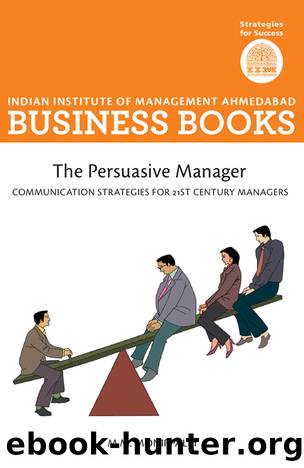IIMA--The Persuasive Manager by M M Monippally

Author:M M Monippally
Language: eng
Format: epub
ISBN: 9788184001693
Publisher: Random House Publishers India Pvt. Ltd.
THE VENDORâS TEMPTATIONS
Pulling customers away from competition through genuine persuasion is hard work, especially when you donât have a distinctly superior product or service to offer. The right approach should then be to work towards making the product or service superior. But that is even harder. So many vendors are buffeted by at least one of two temptations: shackle customers or mislead them. Sadly, a large number of vendors yield to either of these temptations without putting up a fight.
Locking Customers In
During the 1970s and 80s, many domestic cooking gas distribution agencies in India would not release a new connection allotted to you after a long wait unless you bought a stove from them at an inflated price. Many retailers in the state Public Distribution System force customers even now to buy certain damaged or slow-moving items if they want to buy other items in great demand. Such forced bundling doesnât give the customer any benefit; rather, it is an abuse of the monopolistic power those small-time vendors enjoy in their tiny kingdoms.
Whenever commercial organizations enjoy monopolistic power, either because they have government backing or because they have a dominant market share, they use coercion rather than persuasion to prevent customers from going to competitors. Letâs take the case of Air India. Several passengers you see on board this public sector carrierâs flights are there because those flights fit their schedule and purse better than competitorsâ flights; some passengers, however, are there not because they want to be but because they have no choice. They are government employees flying on work or taking leave travel concession; the government would reimburse their airfares only if they flew Air India. The company got the government to introduce this condition when it found passengers courting other more efficient and customer-friendly airlines.
Many well known global software companies including IBM, Microsoft, and Apple use their dominant market position to lock their customers in and generate easy profits without competing fairly with other vendors. So do many big telecom companies. They all virtually imprison their customers by making it difficult or expensive for them to switch to alternative vendors and obtain better service. These multinational giants are no better in this respect than the small-town cooking-gas agency or the village retailer in the Public Distribution System. The multinationals are simply better at masking such coercion and presenting it as protection of standards and intellectual property rights.
That many global companies indulge in such unfair practices is not a good enough reason for us to adopt them when we smell some monopolistic power vis-Ã -vis our customers. We may be able to generate short-term profits through such use of clout but when we try to hold a lot of unhappy and unwilling customers to ransom, we should expect a rebellion sooner or later. The trouble with rebellion is that it doesnât make a distinction between right and wrongâlike molten lava it may destroy everything that comes in its path.
This kind of entrapment is different from the friendly lock-in frequent shoppers including regular flyers experience.
Download
This site does not store any files on its server. We only index and link to content provided by other sites. Please contact the content providers to delete copyright contents if any and email us, we'll remove relevant links or contents immediately.
Hit Refresh by Satya Nadella(9137)
The Compound Effect by Darren Hardy(8969)
Change Your Questions, Change Your Life by Marilee Adams(7783)
Nudge - Improving Decisions about Health, Wealth, and Happiness by Thaler Sunstein(7707)
The Black Swan by Nassim Nicholas Taleb(7129)
Deep Work by Cal Newport(7085)
Rich Dad Poor Dad by Robert T. Kiyosaki(6633)
Daring Greatly by Brene Brown(6514)
Principles: Life and Work by Ray Dalio(6449)
Playing to Win_ How Strategy Really Works by A.G. Lafley & Roger L. Martin(6309)
Man-made Catastrophes and Risk Information Concealment by Dmitry Chernov & Didier Sornette(6019)
Big Magic: Creative Living Beyond Fear by Elizabeth Gilbert(5774)
Digital Minimalism by Cal Newport;(5765)
The Myth of the Strong Leader by Archie Brown(5508)
The Slight Edge by Jeff Olson(5418)
Discipline Equals Freedom by Jocko Willink(5390)
The Motivation Myth by Jeff Haden(5213)
The Laws of Human Nature by Robert Greene(5208)
Stone's Rules by Roger Stone(5088)
